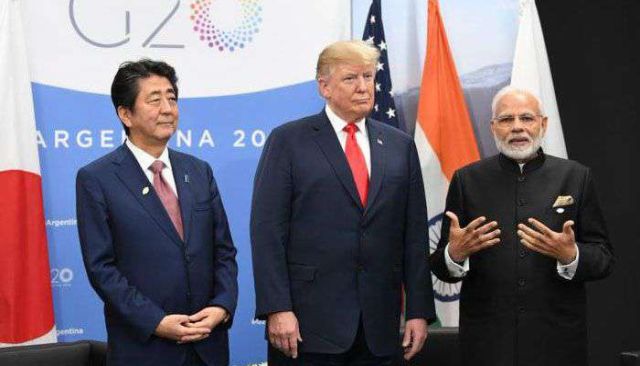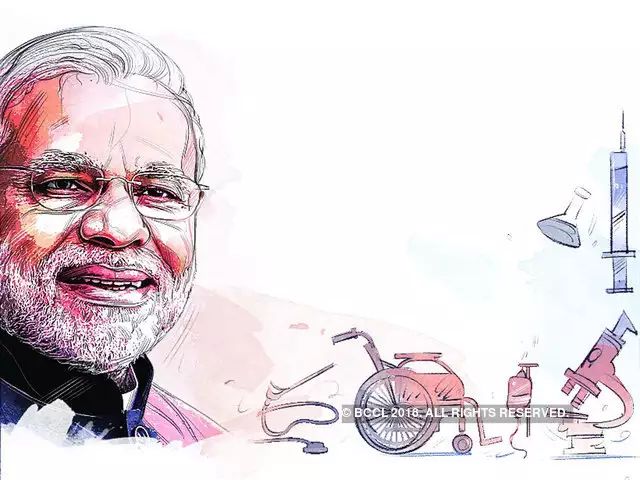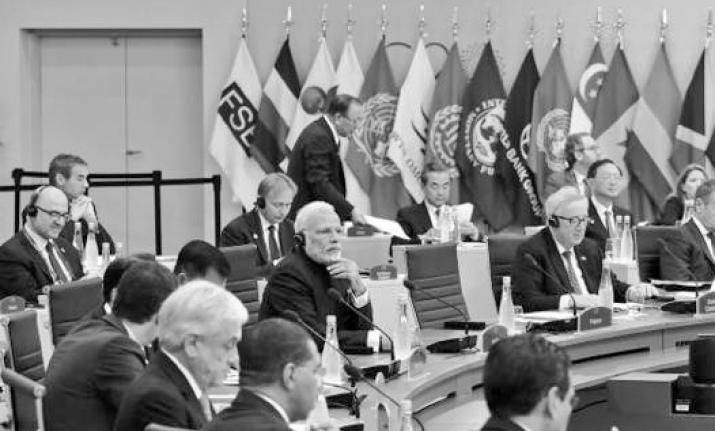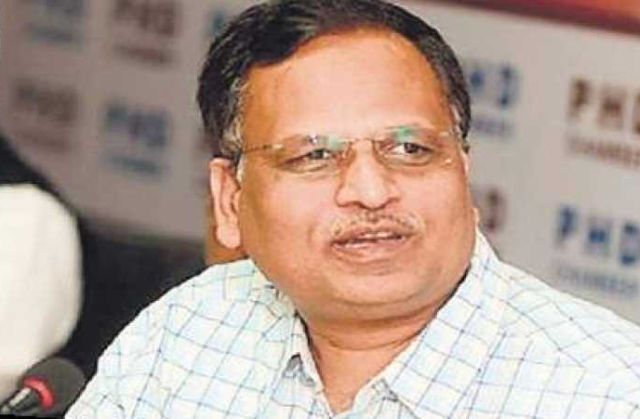
by Editor | May 25, 2021 | News, Politics
 Hyderabad : Prime Minister Narendra Modi on Monday said attempts to provide reservation to minorities are betrayal with the nation and an insult to the framers of the Indian Constitution.
Hyderabad : Prime Minister Narendra Modi on Monday said attempts to provide reservation to minorities are betrayal with the nation and an insult to the framers of the Indian Constitution.
Addressing an election rally of Bharatiya Janata Party (BJP), he called for defeating any such move to protect the country’s unity.
Hitting out at the Telangana Rashtra Samithi (TRS) government for its move to increase reservation for minorities to 12 per cent, Modi said he was surprised how the power-hungry were pushing for religion-based quota for the sake of their family and to save their seats of power.
Stating that the issue of religion-based reservation was discussed in the Constituent Assembly, the Prime Minister said the great personalities framing the Constitution decided against it in the interest of the country’s unity.
Modi wondered from where the reservation for minorities would come when the Supreme Court had already fixed the upper limit of total reservation at 50 per cent.
“They will take away the rights of Dalits, STs and OBCs from backdoor. Will you allow this crime?” he asked the participants in the rally held at L.B. Stadium.
Telangana Assembly had last year passed a resolution to increase reservation for minorities in jobs and education from current 4 per cent to 12 per cent and the same was sent to the Centre. TRS had blamed Modi for the delay in implementing its poll promise made in 2014.
Modi also came down heavily on TRS, saying it destroyed Telangana the way Congress destroyed the nation.
Countering Congress President Rahul Gandhi’s allegation that TRS is ‘B’ team of BJP, Modi said TRS and the Congress had common nature, character, thinking and policies.
The Prime Minister recalled that during the Karnataka Assembly elections, Rahul Gandhi used to dub Janata Dal-Secular (JD-S) as the ‘B’ team of BJP, but after the elections formed the government with the same party to keep the BJP out of power.
Branding the TRS and the Congress as the two sides of the same coin, he alleged that they have already started planning backdoor entry to prevent BJP from coming to power in Telangana.
Modi said both TRS president and Telangana Chief Minister K. Chandrashekhar Rao and Telugu Desam Party (TDP) president and Andhra Pradesh Chief Minister N. Chandrababu Naidu had their apprenticeship in the Congress and this made them natural friends.
He described dynasty politics as a threat to the democracy. He pointed out that barring the BJP, all major parties in fray in the Telangana elections were parties with dynasty politics and family rule.
He said the Congress, TRS, Telugu Desam Party (TDP) and the Majlis-e-Ittehadul Muslimeen (MIM) all were family-ruled parties. “All these parties are becoming threat to democracy,” he remarked.
Modi said Telangana had wasted its five years of welfare due to the arrogance of one family. He alleged that the KCR family exploited emotions of Telangana movement for itself. Stating that Telangana had huge potential, he said the state could not progress because of the kind of rulers it got.
“Why people of Telangana demanded a separate state? Why they suffered so long for separate Telangana. Why so many youth sacrificed their lives? They did it for a bright future of Telangana. One family was not to be given the right to loot Telangana.”
Referring to the TDP’s alliance with the Congress, Modi recalled that N.T. Rama Rao had formed the TDP for the self-respect of Telugu people after former Prime Minister Rajiv Gandhi had insulted them.
He alleged that TDP president N. Chandrababu Naidu for the sake of power and vested interests put the entire party into the lap of Rahul Gandhi.
—IANS

by Editor | May 25, 2021 | World
 By Gaurav Sharma,
By Gaurav Sharma,
Beijing : China on Monday reacted cautiously to the trilateral meet between India, Japan and the US on the sidelines of the just-concluded G20 summit, saying Beijing was okay to such a set-up if it did not disturb peace in the region.
Indian Prime Minister Narendra Modi, Japanese Prime Minister Shinzo Abe and US President Donald Trump had a meeting in Argentina’s Buenos Aires, an event which came against the backdrop of China’s rising influence.
The three countries are part of the so-called Quad, the fourth member being Australia.
Modi, Abe and Trump appealed for an open and inclusive Indo-Pacific region where the Chinese presence has steadily grown.
Responding to the meeting between the three leaders, Chinese Foreign Ministry spokesperson Geng Shuang said: “We remain open to normal cooperation among relevant parties.
“We hope such cooperation will promote mutual trust and cooperation in this region and play a constructive role in promoting the development of peace and prosperity in the region,” he added.
The first such trilateral was an extension of Japan and US bilateral and was dubbed as “JAI” — an acronym for Japan, America and India.
“The three leaders reaffirmed the importance of the Free and Open Indo-Pacific vision for global stability, prosperity and pledged to deepen trilateral cooperation,” India’s Foreign Ministry spokesperson Raveesh Kumar had said.
—IANS

by Editor | May 25, 2021 | Opinions

(Credit: The Economic Times)
By Frank Islam,
India’s public healthcare system is sick. In late September, Prime Minister Narendra Modi’s administration launched Ayushman Bharat, meaning Long Life India, to address this illness.
This initiative, which has been described as the “world’s biggest healthcare programme” will insure more than 500 million Indian citizens who currently have no coverage. Will “Modicare”, as the programme has been labeled, cure what ails India’s public health care system?
The answer is maybe. That answer must be equivocal because of the enormity of India’s healthcare needs, concerns regarding the adequacy of funding to address those needs, and uncertainty regarding Modicare’s implementation.
Healthcare in India today is tale of two groups. The first group is the wealthy and upper middle-class who receive their healthcare primarily from private sector providers. Overall, that healthcare is of good quality and easily accessible but can be expensive.
The second group is the lower middle-class and the poor who receive their healthcare primarily from public sector providers. Overall, that healthcare is of poor quality, difficult to access and the money spent on it is insubstantial.
In 2015, India’s public expenditure on public healthcare was approximately one per cent of its GDP. This compares quite unfavorably to other countries who provide some form of universal healthcare coverage. For example, Singapore expended 2.2 per cent of its GDP, South Korea expended 4.2 per cent and the United States expended 8.5 per cent.
India’s small expenditures are reflected in its healthcare performance. Some of the deficiencies of the current system are:
* The per capita insurance expenditure on healthcare is one of the lowest in the world. Over 75 per cent of Indians have no health insurance.
* Because the states carry the primary burden for healthcare coverage, there is a significant difference in the scope and nature of that coverage across the country.
* There is a huge rural-urban disparity in terms of the quantity and quality of coverage.
* Compared to the rest of the world, India has an average number of doctors but they attend to only one third of the Indian population.
* The lack of adequate insurance coverage and availability of public sector health care causes Indians to have to cover more than 60 per cent of their expenses personally.
Ayushman Bharat is structured to address these conditions. It provides poor families insurance of up to $6,950 (nearly Rs 500,000) for hospitalisation, calls for the establishment of 150,000 health and wellness centres to provide primary care throughout India and emphasises holistic healthcare ideas such as yoga as part of this intervention.
The programme will expand the public health network far beyond the existing governmental hospitals. It will pay public and private sector facilities a fixed rate for covered services. To date, 15,000 hospitals have applied to be certified providers.
This appears to be a solid framework for launching this new initiative. The government has appropriated $1.5 billion for Modicare health insurance for 2018-19 and 2019-20. Of this, $300 million is allocated for the first year of the programme.
This seems like a lot of money. But, $1.5 billion divided by 500 million covered lives means this is only $3,000 per individual — a very modest amount.
The total allocation also seems insufficient when unknowns are considered: What percentage of the-newly insured will take advantage of their coverage in year one? Who provides payment when an insured individual or family exceeds it coverage? To what extent will private sector providers deliver their services at fixed rates to public sector patients, if they can get full payment from more affluent clients?
Another problem is the issue of implementation and roll-out. The new scheme looks good on paper. But establishing 150,000 health and wellness centres is much easier said than done. This is especially true given that doing this will require extensive collaboration and coordination with India’s 29 states and seven Union Territories which have varying levels of capacity and competence.
In sum, this is not a negative or pessimistic perspective on India’s new healthcare programme, but a realistic one. Modicare represents a beginning and an initial step that must be taken to bring India’s healthcare system into the 21st century.
Some have criticised the introduction of this new programme as a political stunt designed to influence the results of the national elections to be held in 2019. Regardless of why it was done, this action was essential given the sad and sorry state of India’s current public healthcare system.
The challenge and opportunity is to continue to move the healthcare ball up the field. The goal for whomever becomes the next Prime Minister should be to make India’s healthcare programme not only the “world’s biggest” but also among its finest. Accomplishing this will help to move India from a developing to a developed nation and bring it closer to becoming a full-fledged world leader.
(Frank Islam is an entrepreneur, philanthropist, civic leader, and thought leader.)

by Editor | May 25, 2021 | Business Summit, Economy, Events, News, Politics
 Buenos Aires : India has called for a strong and active cooperation across G-20 countries — including in legal processes for effective freezing of proceeds of crime and early return of offenders — to deal with fugitive economic offenders and facilitate asset recovery.
Buenos Aires : India has called for a strong and active cooperation across G-20 countries — including in legal processes for effective freezing of proceeds of crime and early return of offenders — to deal with fugitive economic offenders and facilitate asset recovery.
Presenting a nine-point action programme against fugitive economic offenders at the second session of the G-20 Summit on Friday, Prime Minister Narendra Modi said there was a need for a joint effort by member countries to form a mechanism that denies entry and safe havens to all fugitive economic offenders.
He also suggested that the G-20 forum should consider initiating work on locating properties of economic offenders who have tax debt in the country of their residence for its recovery.
“Cooperation in the legal processes such as effective freezing of the proceeds of crime, early return of the offenders and efficient repatriation of the proceeds of crime should be enhanced and streamlined,” he said.
He added that the principles of UN Convention Against Corruption (UNCAC) and UN Convention Against Transnational Organized Crime (UNOTC), especially related to international cooperation, should be fully and effectively implemented.
“The Financial Action Task Force (FATF) should be called upon to assign priority and focus to establishing international cooperation that leads to timely and comprehensive exchange of information between competent authorities and Financial Intelligence Units (FIUs)
“FATF should be tasked to formulate a standard definition of fugitive economic offenders,” Modi said in his nine-point agenda.
He added that the FATF should also develop a set of commonly agreed and standardised procedures related to identification, extradition and judicial proceedings for dealing with such offenders to guide and assist G-20 countries, subject to their domestic law.
“Common platform should be set up for sharing experiences and best practices including successful cases of extradition, gaps in existing systems of extradition and legal assistance,” the Prime Minister said.
—IANS

by Editor | May 25, 2021 | News, Politics

Satyendar Jain
New Delhi : A day after the Centre allowed the CBI to prosecute him, Delhi Urban Development Minister Satyendar Jain on Friday alleged that Prime Minister Narendra Modi wanted to raze down unauthorized colonies and render people homeless.
“Being the Urban Development Minister of Delhi, I am under oath to get the unauthorized colonies authorized. It’s my duty to provide the residents with basic facilities… It is the democratic right of the people staying in these colonies,” Jain said in a statement.
The Union Home Ministry on Thursday granted sanction to prosecute Jain for having assets disproportionate to his known sources of income.
Calling it a vindictive action of the Modi government, Jain said he was amazed by the charges made against him.
“I am amazed at the charges made by the Centre; they are saying Satyendar Jain will become richer by regularizing these colonies. This is laughable and beyond comprehension. How will I become richer by regularizing the unauthorized colonies? Regularization of the unauthorized colonies will not benefit Satyendar Jain but will benefit the huge number of people residing in these colonies,” he said.
Jain, who holds seven portfolios including those of Health, Home and Public Works Department, said the Modi government can file as many cases as it wanted against him but “I won’t be cowed down and I will keep working in the same manner”.
“The people of Delhi have elected me. I will continue working for them with full integrity till my last breath and no amount of witch hunt will deter my resolve,” he said.
Meanwhile, the Aam Aadmi Party’s (AAP) East Delhi Lok Sabha in-charge Atishi said that the Centre’s move against Jain showed that the Modi government was completely against regularizing unauthorized colonies.
“The Prime Minister spends half the time abroad and talks about turning India into Singapore. But he doesn’t want to do that by developing these unauthorized colonies. Instead, he wants to destroy them,” Atishi told the media here.
She further said the Delhi government’s Delhi State Industrial and Infrastructure Development Corp (DSIIDC) had already spent Rs 575 crore on 164 projects in unauthorised colonies.
“Sevety projects worth Rs 303 crore are underway and 40 more projects at an estimated cost of Rs 131 crore are in tendering stage,” she said.
—IANS

 Hyderabad : Prime Minister Narendra Modi on Monday said attempts to provide reservation to minorities are betrayal with the nation and an insult to the framers of the Indian Constitution.
Hyderabad : Prime Minister Narendra Modi on Monday said attempts to provide reservation to minorities are betrayal with the nation and an insult to the framers of the Indian Constitution.



